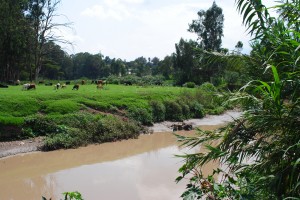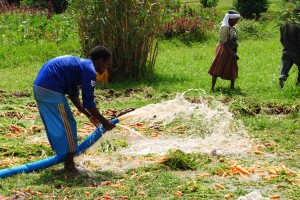Archive for August, 2014
Going Home
Posted by Phoenix McLaughlin in Ethiopia, Phoenix McLaughlin on August 7, 2014
I am sitting in the Frankfurt airport right now waiting to board my flight to Boston. There is certainly a lot to say as my time in Ethiopia ends, but I won’t be saying much of it right now since I have about ten minutes until my flight boards.
I do have time to say this: being a Peacebuilder Fellow in Ethiopia has been the most rewarding work I have ever done. I was endlessly frustrated by many things while living and traveling in Ethiopia, but the work itself was nothing short of inspiring. Almost every organization and individual we contacted went out of their way to help us and led us to amazing stories of the struggles and progress surrounding water in Ethiopia. I would typically feel an incredible sense of exhaustion before our meetings, primarily stemming from the dread of dealing with the transportation system in Addis and elsewhere. But I would leave each meeting with a smile on my face. We spoke to aid workers, academics, government officials, teachers, engineers, farmers, community leaders, and generally concerned citizens, and all of them had something important to say. Even after meeting dozens of individuals over two months, we were still learning many new things at our meetings towards the end. There was simply no shortage of new issues and new perspectives on old issues, all of which were incredibly valuable.
Now I’m going home. I can’t pretend to be sad about that fact in general, but I am sad that my time collecting stories has ended. Fortunately, over the coming weeks I will get to reflect on the many stories we did gather as Katie and I work on creating our final products.
My Veggie Dilemma
Posted by Katie Petitt in Ethiopia, Katie Petitt on August 3, 2014
Three weeks ago was day 3 for interviews. A lovely and generously new friend offered to take us to the Akaki river, just outside of Addis. She has recently finished her MA and her focus of study was the water quality of the Akaki river. This river has vegetable farmers on it and it is well known for producing veggies that are contaminated with bacteria. Many Addis residents ask their vegetable stand vendors where they get their vegetables to make sure they do not buy from this area.
The vegetables contain bacteria because of the river water the farmers use to irrigate. When Phoenix and I learned of this story, we knew we had to follow it. So off we went to find these farmers. Our friend led the way by organizing the hired car (free from forenji price!). What was suppose to be a 30 min drive turned into 2 hours (thank you Addis traffic), but we eventually made it to our destination. We found a patch of land along the river and asked around until we found some farmers. We arrived just in time because the majority of farmers were finishing their daily work on the communal land and headed back home to work on their own plots. We were greeted with open arms and the farmers spoke very freely with us about the water, their farming and their practices. They offered for us to take some pictures and then the rest were on their way. Two agreed for an interview and they were wonderfully impressive people: very educated on their situation and the quality of the water. I will skip the majority of the content of the interview as a teaser to keep following our work, but I want to say that they are convinced that the quality of the product is okay.
Fast forward a few minutes, and Phoenix, our friend and I are down at the farm to see the irrigation and the river. The hospitable people that they are, our hosts sent us home with a bushel of carrots and a couple cabbages. Their season is almost at an end and they are preparing for the rainy season to flood their field, so this was an incredibly generous offer as they gave us some of the last of their crops.
Here is a picture of the infamous water that the people of Addis are so afraid of, and here is a picture of the farmers rinsing carrots with said water. Here is a picture of me with my bounty.
The rest of the day was wonderful and the traffic heading back was not as bad. Phoenix and I left our guide and our new driver friends with plans on how to cook up our goodies that evening. I have a carrot dish I really like making and we were going to pair it with a stir-fry (we are missing soy sauce a bit). Seven pm rolled around and I had soaked the veggies and was ready to start cooking. My roommate came in to chat, and when she saw these soaking veggies she asked if I wanted to treat them. She told me that there was a river around here that veggies come from and because there was so much bacteria in the river and veggies, we should always treat veggies with a chlorine or bleach solution just in case they are from that area. After an inner debate with myself, I decided to tell her that these veggies were from that very place she had heard of. She paused, looked at me like I was crazy, and then said “Well, yeah… use that then,” pointing to the cleaning chemical.
I take issue with chemicals going into my body, so I can’t really douse veggies in bleach or chlorine; it just makes no sense to me. Yet, as Phoenix and I discussed dinner plans, we also thought about the chemicals that were possibly in our friends’ gift. Moral dilemma: eat the veggies and prove to Addis that, as the farmers had said, these vegetables were fine for consumption, or stick to my chemical-free veggie regimen. I thought about the food we could make, the pictures I could show, and maybe even the ad campaign we could produce for these struggling farmers to help win their business back. After about 30 minutes of weighing the pros and cons about eating these things we decided to air on the side of caution and not eat them. New moral dilemma: I hate wasting food. I tried to feed these things to the dogs (sorry that was probably a mean thing to do); they didn’t want them. So I decided to compost them. Now, we don’t have a compost pile, but we have a pile of dirt in the back yard. I tossed the veggies there thinking they would do the soil good as they compost. I walked away thinking the best possible outcome was complete. I turned back and saw the veggies sitting there looking sad and wasted. I was embarrassed to have my roommates see these things and think I am wasteful or insensitive to those who are hungry around me. I saw a shovel lying on the ground, and I did what was needed, I buried them so they would mock me no more. The veggies now lie buried in my yard. I am sorry vegetables, I am sorry farmers, I am sorry Addis consumers. I, like the rest of Addis, could not risk my stomach’s happiness on these items. I wanted to prove the system wrong, but instead realized a new direction for my indignation over the farmer’s injustice. I want to advocate for these farmers to get access to get to their very easily accessible ground water. It is under there, and they just need money and your support to get to it. With this water they can sell to consumers who will no longer be wary of how the fields are irrigated or the vegetables washed. With this clean water, we can all eat stir-fries without hesitation.
An organization called Acord has been working with this group of farmers on diversifying their farming during the rainy months, providing advocacy trainings and also supplying some equipment. The farmers informed us that, Acord is working on raising the money needed to access this ground well for the irrigation of their crops. If you would like to donate to this cause you can visit the Accord site here. I want to shine a small light on the situation these men and women face without clean water. They want to sell a good product yet there is not much they can do about the quality of the river. My hope that no more veggies need to be buried and their clean water well can be uncovered soon.









